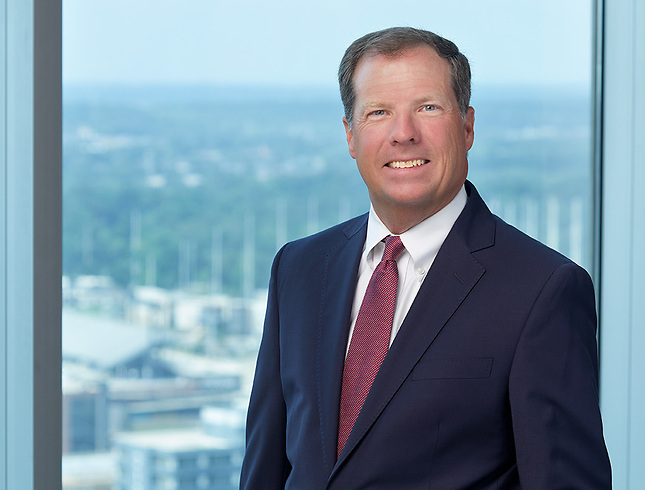- Partner
Gerald Gillespy counsels and represents clients in commercial and business disputes, as well as class actions and coverage litigation.
Gerald is a partner in the firm’s Litigation section. His practice has focused on commercial ...
Is a Licensed Securities Dealer a "Professional" Under Alabama Law Prohibiting Enforcement of Nonsolicitation Agreements Against Professionals? (UPDATE)
The Alabama Court of Civil Appeals released a slip opinion on May 16, 2014 addressing enforcement of a nonsolicitation agreement against a licensed securities broker. See G.L.S. & Associates, Inc., and G.L. Smith & Associates, Inc. v. Keith Rogers, No. 2130322 (Ala. Civ. App. May 16, 2014) (Slip Opinion). The defendant (Rogers) worked for a securities firm (GLSA) and had an employment agreement that contained a nonsolicitation provision which prohibited Rogers from soliciting GLSA's clients for a period of two years after termination of employment. Rogers resigned from his employment in January 2013. Thereafter, GLSA filed a complaint against Rogers, attaching the employment agreement to the complaint, and arguing that Rogers had solicited GLSA's clients in violation of the agreement. At the trial court level, Rogers moved to dismiss the complaint under Rule 12(b)(6) for failure to state a claim, averring that he was a "professional" and therefore the nonsolicitation provisions were unenforceable under Alabama law, in particular, Section 8-1-1 of the Alabama Code and the factors for determining whether an occupation is a "profession" as set out by the Alabama Supreme Court in Friddle v. Raymond, 575 So. 2d 1038, 1039 (Ala. 1991) (factors are "professional training, skill, and experience required to perform certain services; delicate nature of the services offered; and the ability and need to make instantaneous decisions") (citing Odess v. Taylor, 211 So. 2d 805 (Ala. 1968)). Rogers argued that the employment agreement established that he was a "professional," as the agreement required him to be registered with the NASD (now FINRA) and to comply with state and federal statutes governing the sale of securities. Neither Rogers nor GLSA presented any evidence, and Rogers instead relied solely upon the allegations of the complaint and the attached employment agreement. The trial court granted the motion, noting that the issue of whether a licensed securities broker is a "professional" was one of first impression. The trial court found that Rogers was engaged in a "profession" and therefore the nonsolicitation provisions in his employment agreement could not be enforced. The plaintiff, GLSA, filed a post-judgment motion, arguing that the trial court erred in ruling on the motion to dismiss without first receiving evidence on the issue of whether Rogers' occupation met the criteria of a "professional" under Friddle. The post-judgment motion was denied by operation of law, and GLSA appealed to the Alabama Supreme Court which transferred the appeal to the Alabama Court of Civil Appeals. The Court of Civil Appeals reversed, holding that the complaint should not have been dismissed under Rule 12(b)(6) for failure to state a claim based solely on the allegations in the complaint and the employment agreement attached to the complaint. The court concluded "that the inquiry whether a particular occupation is a profession requires evidence relevant to the Friddle factors." (Slip Op., p. 14). The court found that the employment agreement (and the requirement that securities brokers be licensed) "does not, in and of itself, compel the conclusion that securities brokers are engaged in a profession." (Id., p. 16). Noting that Rogers had not even presented an affidavit on the Friddle factors, the court stated that based on the sparse information in the record, the court could not agree "that there is no set of facts under which GLSA might prevail in its efforts to enforce the nonsolicitation provision of the employment agreement." (Id.). The court reversed and remanded the matter back to the trial court to conduct an evidentiary hearing on the issue, adding that Rogers may be able to prove that he was engaged in a profession at such a hearing. Updated 11/26/14: After the case was remanded, counsel for Rogers withdrew from representing the defendant, and the plaintiffs filed a motion to dismiss the action, without prejudice, which was granted on October 31, 2014. Accordingly, no evidentiary hearing was or will be conducted in this case on the issue of whether under Alabama law a licensed securities dealer is a "professional" under the Friddle factors or whether there was some set of facts under which GLSA might prevail in its efforts to enforce a nonsolicitation provision against a licensed securities dealer. However, this case sets a framework for the next dispute that may arise concerning the enforcement of a nonsolicitation provision against a licensed securities dealer, and instructs that the parties should submit evidence on the subject at the trial level addressing the Friddle factors, via a motion for summary judgment under Ala. R. Civ. P. 56.
Posted in: Third Circuit Court
Tags: alabama, Alabama Supreme Court, GLSA, Nonsolicitation Agreements, Rule 12(b)(6), The Alabama Court of Civil Appeals

